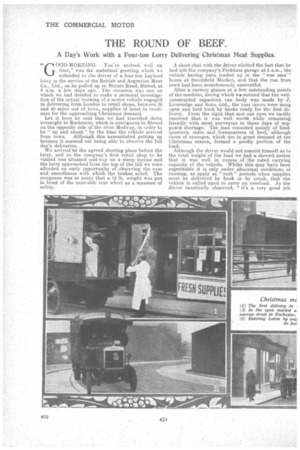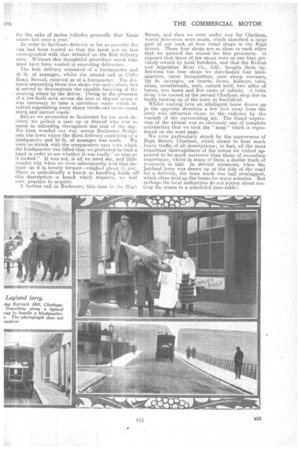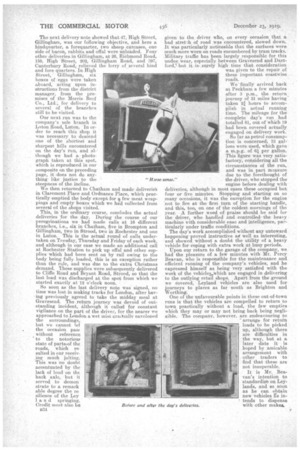THE ROUND OF BEEF.
Page 10

Page 11

Page 12

If you've noticed an error in this article please click here to report it so we can fix it.
A Day's Work with a Four-ton Lorry Delivering Christmas Meat Supplies.
" 00D-MORNING. You've arrived well on
time," was the inatutinal greeting which we extended to the driver of a four-ton Leyland lorry in the service of the British and Argentine Meat Co., Ltd., as he pulled up in Bryant Road, Strood, at 8 a.m. a few days ago. The occasion was one on which we had decided to make a personal investigation of the actual working of a motor vehicle engaged in delivering from London to retail shops, between 30 and 40 miles out of town, supplies of meat in readiness for the approaching Christmas demand.
Let it here be said that we had travelled down overnight to Rochester, which is contiguous to Strood on the opposite side of the river Medway, in order to be " up and about" by the time the vehicle arrived from town. Although this necessitated getting up betimes it assured our 'being able to observe the full day's deliveries. ,
We arrived at the agreed starting place before the lorry, and as the company's first retail shop to be visited was situated nod-way on a steep incline and the 'may approached from the top of the hill we were afforded an early opportunity of observing the ease and smoothness with which the brakes acted. The steepness was so acute that a 12 lb. weight was put in front of the near-side rear wheel as a measure of safety. A short chat with the driver elicited the fact that he had left the company's Peckliatn garage at 5 a.m., the ehiclo having been loaded up in the "wee sma,'" hours at Smithfield Market, and that the run from town had been monotonously. uneventful.
After a cursory glance at a few outstanding points of the machine, during which wo noticed that the wellconstructed capacious van • body was made by J. Liversidge and sons, Ltd., the rear doors were hung open anu held back by hooks ready for thc first delivery. From the sight that met our eyes we tacitly resolved that it was well worth while remaining friendly with meat purveyors in these days of supposed shortage. The load consisted mainly of hindquarters,sides and forequarters of beef, although cases of sausages, which are in great demand at the Christmas season, formed a goodly portion of the load., • Although the driver would not commit himself as to the total weight of the load we had a shrewd notion that it was well in excess of the rated carrying capacity of the vehicle. Whilst this may have been regrettable it is only (under abnormal conditions of running, as apply at "rush" periods when supplies must be delivered by hook or by crook, that the vehicle is -called upon to carry an overload. As the
caustically observed, it's a very good job for the sake of motor vehicles generally that Xmas comes but once a. year." * In order to facilitate delivery so far as possible the van had been loaded so that the .meat put on last corresponded with that detailed on the first delivery note. Without this thoughtful procedure much time must have been wasted in executing deliveries.
The first delivery consisted of a hindquarter and 26 lb. of sausages, whilst the second tall in Cliffe Road, Strood, relieved us of a forequarter. The distance separating these -two shops was quite short., but it served to demonstrate the capable handling of the steering wheel by the driver. Owing to the presence of a low-built arch across the footoi Bryant rioau it was necessary to take a circuitous route which involved negotiating many sharp twists and turns round steep and narrow roads.
Before we proceeded to Rochester for the next delivery we picked a. ina.n up in Strood who was to assist in unloading throughout the rest of the day. We then, wended our way across Rochester Bridge into the town where the third delivery consiFting ol hindquarter and 50 lb. of sausages was made. We were so struck with the comparative ease with which the hindquarter was lifted that we proferred to lend a hand in order to see whether it was really " as easy as it looked." It was not, is all we need say, and little wonder why when we were subsequently told that the hind—as it is tersely termed—weighed about l cwt. There is undoubtedly a knack in handling loads of this description—a knack which requires, we feel sure, practice to acquire. A further call in Rochester,this time in the High Street, and then we were under way for Chatham, where deliveries were made, which absorbed a large part of our load, at four retail shops in the High Street. These four shops are so close to each other that We queried the reason for this proximity. It appears that three of the shops were at one time iirivately owned by local butchers, and that the British and Argentine Meat Co., Ltd., bought them up. Between the four shops we distributed foer hindS quarters, three forequarters, nine sheep carcases, 162 lb. sausages, ox hearts, livers, kidneys, tails, shins, sweetbreads, suet, corned beef, two sides of bacon, two hams and five cases of rabbits. A little delay was caused at the second Chatham shop due to faulty loading up of the lorry at Smithfield:
Whilst waiting here an intelligent horse drawn up in the opposite direction a few feet away from the lorry was attracted closer to the radiator by the warmth Of the surrounding air. The bland expression of the animal was so obviously one of complete satisfaction that we took the " snap'' which is reproduced on the next page. We were particularly struck by the narrowness of High Street, Chatham, which seems to bear much heavy traffio of all descriptions; in fact, all the most important thoroughfares, of the towns we visited appeared to be much narrower than those of secondary importance, whilst in many of them a double track of trail-wails is laid. In several instances, when the Leyland lorry was drawn up at the side of the road for a delivery, the tram track was half overlapped, which often held up the trams for many minutes. But perhaps the local authorities do not bother about running the trams to a scheduled time-table! The next delivery note showed that 47, High Street. Gillingham, was our following objective, and here a hindquarter, a forequarter, two sheep carcases, one side of bacon, rabbits and offal were unloaded. Four other deliveries in Gillingham, at 26, Richmond Road, 159, High Street, 202, Gillingham Road, and 397, Canterbury Road, relieved the lorry of several hind and fore quarters. In High Street, Gillingham, six boxes of eggs were taken aboard, acting upon instructions from the district manager, from the premises of the Morris Beef Co., Ltd.; for delivery. to several of the branches still to be visited.
Our next run was to the company's sole branch in Litton Road, Luton. In order to reach this shop it was necessary to descend one of the shortest and sharpest hills encountered on the day's run, and although we had a photograph taken at this spot, which is reproduced in our composite on the preceding page, it •does not do anything like' justice to the steepness of the incline.
We then returned to Chatham and made. deliveriea in Claremont Place and Ordnance Place, which practically emptied the body except for few meat wrappings and empty boxes which we had collected from several of the shops visited. This, in the ordinary course, concludes the actual deliveries 'for the day. During the course of our peregrinations we had made calls at 16 different branches, i.e., six in Chatham, five in Brompton and Gillingham, two in Strood, two in Rochester and one in Luton. This is the actual round of calls undertaken on Teesday, Thursday and Friday -of each week, and although in our case we made an additional call at Rochester Station to pick up offal andother supplies' which had been sent on by rail owing to the body being fully loaded, this is an exception rather than the rule, and was due to the extra Christmas demand. These supplies were subsequently delivered to Cliffe Road and Bryant Road, Strood, so that the last load was discharged at the spot from which we started exactly at 12 o'clock noon.
B31 .
given to the driver who, on every occasion that a bad stret.th of road was encountered, slowed down.
It Was particularly noticeable that the surfaces weremuch more warn on roads encumbered by tram tracks.
Military traffic has been largely responsible for this undue wear, especially between Gravesend and Dartford, but it is, surely high time that consideration was given to the repair of these importantcoastwise roads.
We finally arrived back at Peckham a few minutes after 3 p.m., the return. Journey of 31 miles having taken 21 hours to ace em-. plish in actual running time. The mileage for the; complete day's run had totalled 81, out of which 19 had been covered actually engaged on delivery work.
So far as petrol consumption is concerned; /3 gal
lons were used, which gave a m.p.g. of 6.1 per gallon. This figure was very satisfactory, considering all the circumstances of the run,
and was in part measure due to the forethought of the driver, who stopped the engine before dealing with deliveries, although in most cases these occupied but four or five minutes. Stopping and starting on so many occasions, it was the exception for the engine not to fire at the first turn of the starting handle, and this, too, on one of the coldest mornings of the year. A further word of praise should be said for the driver, who handled and controlledthe heavy machine with considerable ease and intelligence, par ticularly under traffic conditions. The day's work accomplished without any untoward happening proved instructive as well as interesting, and showed without a doubt the utility of a heavy vehicle for coping with extra work at busy periods. Upon our return to the garage of the company, we had the pleasure of a few minutes with Mr. Percy Beavan, who is responsible for the maintenance and efficient running of the company's vehicles, and he
expressed himself as being very satisfied with the work of the vehicles...Which are engaged in delivering to the outlying retail shops. Apart from the ground we Covered, Leyland vehicles are also used for journeys to places as far south as Brighton and
Worthing. One of the unfavourable points in these out-of-town ruins is that the vehicles are compelled to return to town practically without a load, the few empties which they may or may not bring back being negli gible. The company. however, are endeavouring to arrange for return loads to be picked up, although there are difficulties in the way, but at a later date it is hoped by amicable arrangement with other traders to find that these are not insuperable.
It is Mr. Beavan's intention to
Istandardiza on Ley-. lands, and so soon as he can obtain new vehicles lie intends to dispense with other makes.


























